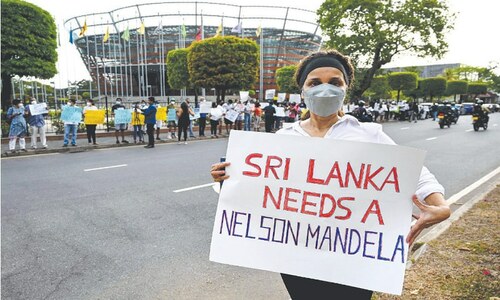COLOMBO: Sri Lanka urged its citizens overseas to send home money to help pay for desperately needed food and fuel on Wednesday after announcing a default on its $51 billion foreign debt.
The island nation is in the grip of its worst economic crisis since independence in 1948, with severe shortages of essential goods and regular blackouts causing widespread hardship.
Central bank governor Nandalal Weerasinghe said he needed Sri Lankans abroad to “support the country at this crucial juncture by donating much needed foreign exchange”.
His appeal came a day after the government announced it was suspending repayments on all external debt, which will free up money to replenish scant supplies of petrol, pharmaceuticals and other necessities.
Weerasinghe said he had set up bank accounts for donations in the United States, Britain and Germany and promised Sri Lankan expatriates the money would be spent where it was most needed.
The bank “assures that such foreign currency transfers will be utilised only for importation of essentials, including food, fuel and medicines”, Weerasinghe said in a statement.
Tuesday’s default announcement will save Sri Lanka about $200 million in interest payments falling due on Monday, he said, adding that the money would be diverted to pay for essential imports.
Weerasinghe’s appeal has so far been greeted with scepticism from Sri Lankans abroad. “We don’t mind helping, but we can’t trust the government with our cash,” a Sri Lankan doctor in Australia told AFP, asking for anonymity.
A Sri Lankan software engineer in Canada said he had no confidence that the money would be spent on the needy. “This could go the same way as the tsunami funds,” he said, referring to millions of dollars the island received in aid after the December 2004 disaster.
Much of the foreign cash donations meant for survivors was rumoured to have ended up in the pockets of politicians, including current Prime Minister Mahinda Rajapaksa, who was forced to return tsunami aid funds credited to his personal account.
Sri Lanka’s snowballing economic crisis began to be felt after the coronavirus pandemic torpedoed vital revenue from tourism and remittances.
Published in Dawn, April 14th, 2022













































